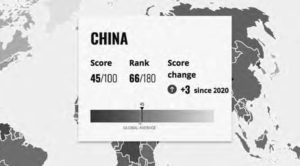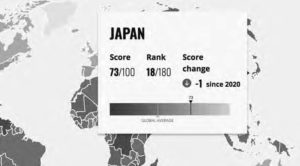Transparency, or the lack thereof, is a critical factor in evaluating any nation. The column that follows focuses upon Asia’s six most-populous countries. In order to enhance teacher and student critical thinking about transparency, the column also includes content on two of the most-populous Western nations, the United States and the Federal Republic of Germany.
Transparency International is an independent, non-governmental, not-for-profit organization working to document corruption in the public and private sectors of 180 countries and territories. They conduct extensive global research to expose the systems and networks that enable corruption to thrive, demanding greater transparency and integrity in all areas of public life as well as promoting accountability and integrity at all levels and across all sectors of society. The Corruption Perceptions Index (CPI) is a report released annually by Transparency International and the latest data available is from 2021.
The CPI, in addition to providing world rankings of nations, also includes regional reports. What follows are CPI general descriptions for the Asia Pacific region:
Asia has witnessed ten years of mass movements calling for action against corruption, but sadly little has changed. Public outrage has instead been co-opted by strongmen—in the form of populist leaders in democratic countries and authoritarians elsewhere.
From India to the Philippines to China, such leaders have been able to portray themselves as more effective than state institutions and win mandates to gain and stay in power. However, only a few of these countries have managed to make progress in controlling corruption and these gains remain fragile. Furthermore, in most countries, corruption is spreading through severe restrictions on the very civil liberties—like freedom of association and speech—which allowed people to take to the streets and call for action.
The CPI measures how corrupt each country’s public sector is perceived to be, according to various experts. Each country’s score is a combination of at least three data sources drawn from thirteen different corruption surveys and assessments. These data sources are collected by a variety of reputable institutions, including the World Bank and the World Economic Forum. The data sources used to compile the CPI assess various manifestations of public sector corruption including bribery, diversion of public funds, officials using their public office for private gain without facing consequences, the ability of governments to contain corruption, nepotism in civil service appointments, public access to information on government affairs, and legal protections for those who report instances of corruption. A country’s score is the perceived level of public sector corruption on a scale of 0–100, where 0 means highly corrupt and 100 means very clean, while a country’s rank is its position relative to the other countries in the index.
In this column, we include CPI rankings for the six most populous Asian countries, as well as two of the most populous Western countries for comparison.
As the organization notes in the Asia Pacific CPI: “A concerning trend [Japan is a profound exception] across some of these nations is a weakening of anti-corruption institutions or, in some cases, absence of an agency to coordinate action against corruption.”
The People’s Republic of China
Population (Nov. 2022): 1.45 billion
CPI Score 45/100
CPI Rank 66/180 (World), 6/18 (Asia)
In the case of the PRC, the CPI shows a nine-point gain (from 36 to 45) since 2014. This is in line with President Xi Jinping’s strong anti-corruption rhetoric. He has reinforced top-down controls and clamped down on some of the most brazen forms of corruption that deter investment and economic growth. However, new forms of corruption have started to emerge, including collusion, where high-level officials use their powers to redistribute formerly state-owned assets to themselves and politically-connected firms. Furthermore, The PRC’s anti-corruption strategy is inherently limited by the country’s disregard for human rights and fundamental freedoms. This makes it impossible for civil society and a free press to serve as anti-corruption watchdogs.

India
Population (Nov. 2022): 1.41 billion
CPI Score 40/100
CPI Rank 85/180 (world), 7/18 (Asia)
The case of India is particularly worrying. While the country’s score has remained stagnant over the past decade, some of the mechanisms that could help reign in corruption are weakening. There are concerns over the country’s democratic status, as fundamental freedoms and institutional checks and balances decay. Journalists and activists are particularly at risk and have been victims of attacks by the police, political militants, criminal gangs and corrupt local officials. Civil society organizations that speak up against the government have been targeted with security, defamation, sedition, hate speech and contempt-of-court charges, and with regulations on foreign funding.
Indonesia
Population (Nov. 2022): 281 million
CPI Score 38/100
CPI Rank 96/180 (world), 9/18 (Asia)
In 2019, new legislation significantly reduced the authority of the Indonesian government’s Corruption Eradication Commission (KPK), established following the overthrow of the authoritarian Suharto regime in 1998, to prevent and fight corruption in the nation. Tensions persisted between the KPK and other Indonesian government institutions for years until President Joko Widodo’s regime passed legislation crippling the ability of the KPK to perform investigations into corruptions cases. The legislation led to widespread student protests in September 2019—the most prominent movement since the protest that led to Suharto’s resignation
Pakistan
Population (Nov. 2022): 232 million
CPI Score 28/100
CPI Rank 140/180 (world), 14/18 (Asia)
Pakistan ranks among the most systemically corrupt countries in the world with rampant bribery across the public sector and government institutions, and a judiciary which shields such practices from prosecution Although not included in the 2021 CPI description, Prime Minister Imran Khan became the first Prime Minster to be removed from office on April 10, 2022 after a vote of no confidence against him a week earlier. Khan was accused of poor governance, illegally selling state gifts, and economic failures by leaders of an opposing party. Khan immediately ordered that the
National Assembly be dissolved before a vote could be taken up alleging a politically motivated coup involving foreign powers for a regime change. This dissolution was ruled unconstitutional by the Supreme Court of Pakistan and Khan was removed from office shortly afterwards. He survived an assassination attempt later during a political rally in November 2022.
Bangladesh
Population (Nov. 2022): 169 million
CPI Score 26/100
CPI Rank 147/180 (world), 16/18 (Asia)
Bangladesh ranks as the most corrupt country in Asia and among the most corrupt in the world. Corruption is so embedded in ordinary life that citizens routinely pay bribes for basic services and many government officials are dependent on bribes for a living. Contradictory regulations are frequently exploited by officials seeking informal payments. In May 2020, an executive engineer, Delowar Hossain, working on a major road construction project made a public stance against corruption when he refused to let several contractors involved in the project withdraw money from the appropriated budget without completing the construction. He also refused bribes from these contractors as well as refused to increase the work bill amount for the government. He was murdered with the involvement of these contractors heavily suspected. Authorities claim he was murdered during a dispute with other coworkers. The government formed an Anti Corruption Commission in 2004 but it is largely considered completely ineffectual due to corrupt governmental oversight.
Japan
Population (Nov. 2022): 126 million
CPI Score 73/100
CPI Rank 18/180 (world), 1/18 (Asia)
Japan ranks as the least corrupt organization in Asia.

Transparency: The US and The Federal Republic of Germany
United States
Population (Nov. 2022): 336 million
CPI Score 67/100
CPI Rank 27/180 (world) 18/31 (among Western nations)
Germany
Population (Nov. 2022): 85 million
CPI Score 80/100
CPI Rank 18/180 (world), 9/31 (among Western nations)

